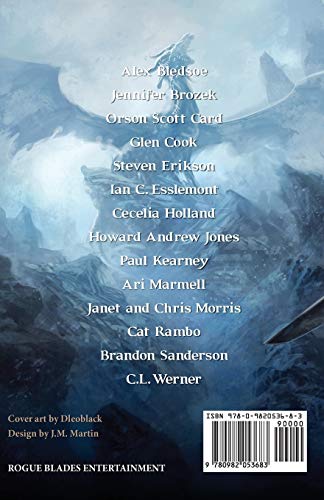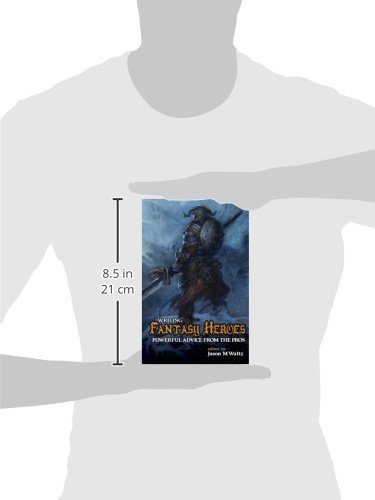



Full description not available
K**H
"Secrets" to Writing Great Fantasy Revealed
If you're looking for a technical manual on the nuts and bolts of writing, things like basic story structure, you won't find it here. Well, not much, anyway. This book is designed more for the aspiring writer who is looking to hone his or her craft and take it to the next level, which preferably would involve publication, rather than the novice writer just learning to put a story together. The "secrets" to writing great fantasy, if you will.I read Writing Fantasy Heroes from cover to cover, albeit in pieces between other books, but I think the book's values rests in its use as a reference that one picks up and consults as needed more than as volume to read straight through. The reason I say that is that each chapter addresses a different aspect of heroic fantasy, and not all aspects will appear in all stories or novels.For example, Howard Andrew Jones discusses the dynamics between partners/friends/comrades and how to use the interaction between two heroes to best effect. Paul Kearney explains what it really takes to move a large army and to fight a major battle. not so much the combat itself (although he does address that issue), but the logistics involved in military life. Alex Bledsoe contrasts the older, wiser hero with the young pup and delves into how to write maturity in a way that's consistent with the reality of that stage in life..Ari Marmell talks about using tropes effectively and how to avoid cliche in doing so. Glen Cook deals with adding a dash of the unexpected. C. L. Werner discusses things from the monster's perspective. Brandon Sanderson blocks out several fight scenes, taking them from boring to engrossing. Ian C. Esslemont demonstrates the difference between showing and telling.There's much more. One of the added bonuses is that Jason Waltz required each contributor to use examples from his or her own work. I found several authors whose work I want to hunt down and read through this process, so thanks, Jason.I learned a lot from this book. More than that, some of the chapters helped me to bring together concepts or techniques I'd been more or less aware of and helped me either to see them in a new light or to see new connections or applications of them. It was the same kind of A-Ha moment I get when I gain new insight into a physical system after studying a scientific problem. One of those Oh-of-course!-Why-didn't-I-see-that? kind of thing.There's a lot of good advice here, and while I'm not the brightest bulb in the chandelier, I like to think I've acquired enough wisdom to realize that there things in this book I'm not ready for yet. What that means is that I haven't yet tried to write the story where I need that piece of counsel. But if/when I try to write that story, I know where to go to find out how it's done.The list of contributors is impressive, with some of the major names in the field weighing in on various aspects of the craft. The glimpse into their minds is fascinating at times. And invaluable.As I stated at the beginning of this review, this isn't an introductory writing manual. It's delves into the deeper, more accomplished aspects of the craft. If you write heroic fantasy, or aspire to, then this book needs to be on your shelf. It will be more valuable to you than any number of the writing guides out there.
A**G
An Excellent Collection of Essays
A collection of analyses and ruminations on the topic of heroism.A must read for any writer intent on bringing heroes to life in their stories, or to curious readers of heroic fiction interested on dissecting the media they consume.A masterful work on the part of the entire team that brought this book to fruition. My only complaints are not on the quality of the work, which deserves a full 5 stars.I found one of the essays to be uncomfortably sexist and ageist in its assumptions about people, but your mileage may vary. I also found distasteful the inclusion of an author that is known for their homophobic beliefs and financial support of homophobic organizations. But aside from these two minor quibbles, the rest of the cast is quite excellent.
L**G
Quite Enjoyable!
I'm giving this book four stars because I enjoyed pretty much every word in it. So why not five? Because for the most part I did not come away from the book with any great insights that would change the course of my writing. It was a very entertaining read, especially Orson Scott Cards' section, but there wasn't anything terribly earthshaking in terms of the creative process. The one exception I will make in this claim is Jennifer Brozek's section on NPCs.In her essay, Jennifer describes how the NPC can be used to display the thought processes of the hero. In one example she uses an injured horse, and what decisions the hero makes in dealing with it, to show what kind of a person he is. Later she uses another example with the hero's reaction to an object he finds on the corpse of one of his enemies. In other words, the NPC doesn't have to be an observer, making comments about the hero, it doesn't even have to be a living person, or a person at all. They are there to serve as a catalyst, to make the hero think, grow, show us his true self.The other bonus I got from this book was a whole bunch of new books to add to my "to read" list. That was worth the read right there.I definitely recommend this book. It's short, entertaining, full of interesting observations (which may or not assist with your writing), and may provide you with new sources of reading enjoyment.
V**S
A few useful tips, but otherwise quite useless
Half of it was completely useless and quite boring. The other half was partly useful, though I could see people who know absolutely nothing about writing getting some decent pointers from this book (which is why I gave it three stars instead of two.) Nonetheless, the chapters are unnecessarily long and most of the examples used to show what the particular author was trying to explain did very little to help. It's worth reading for the few useful tidbits of info, but don't expect much.
A**S
There was informative and practical advice in Writing Fantasy Heroes, from masters of the craft.
There was informative and practical advice in Writing Fantasy Heroes, from masters of the craft. Each chapter is written by a different author, and many of the authors use past heroes as examples or relate heroic deeds to how we feel as heroes and how society perceives heroes.I found the cinematic action scenes chapter by Brandon Sanderson particularly practical and useful, by taking it in stages and making the scenes more meaningful. The examples here were superb.Of interest to my writing was a chapter written by Jennifer Brozek on how to involve NPCs, your supporting characters, in helping to construct a story and add ‘character’ to them that can also impact how we view the main character or what it says about the main character’s personality. I found this really helpful in looking at the bigger picture of writing stories as opposed to focusing on a single main character.Glen Cook wrote a chapter on ‘Sh*t Happens in the Creation of Story, Including Unexpected Deaths, with Ample Digressions and Curious Aside’. I found this chapter one of the most interesting reads because it was about that aspect of writing, and life, that isn’t often acknowledged: sh*t happens. And sometimes you can’t do anything about the fact that sh*t happens, only that you need to respond to it. There were enough ironic examples here to keep me fascinated in the chapter and point of view.
M**E
Professional advice from professional writers you've heard of...
...or should have heard of, or will soon have heard of, or would have heard of were you a fan of certain high-end franchises - click through the author list and you'll see what I mean.Some of the contributors are veterans, some established in their field, and some the Next Big Thing. What unites them is that they have credentials. That matters in books like this.My own credentials in writing this review? I'm a very minor pro at the start of my career (two franchise contracts and two original works with an agent). I'm still open to new advice, but I`m also keenly aware of how I struggled to get my skills even to this level.In this book, I recognise a lot of lessons I had to learn by trial and error (read, "being butchered by my crit circle"), some that I had intuited but not really used knowingly, and some that had me doing the face palm.So, it's not a how-to to start you off on the basics of writing, for that you need something like Techniques of the Selling Writer . Rather it's a master class; here's how to write fantasy heroes and make them really work.I wish I had had this book earlier... Techniques of the Selling Writer
T**N
Four Stars
Nice to dip into. Some great help here.
Trustpilot
3 weeks ago
2 weeks ago